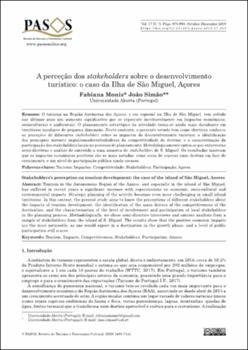A perceção dos stakeholders sobre o desenvolvimento turístico - o caso da ilha de São Miguel, Açores
Date
2019Abstract
O turismo na Região Autónoma dos Açores, e em especial na Ilha de São Miguel, tem sofrido
nos últimos anos um aumento significativo que se repercute inevitavelmente em impactos económicos,
socioculturais e ambientais. O planeamento estratégico da atividade torna‑se
ainda mais desafiante em
territórios insulares de pequena dimensão. Neste contexto, o presente estudo tem como objetivos conhecer
as perceções de diferentes stakeholders sobre os impactos do desenvolvimento turístico; a identificação
dos principais motores impulsionadores/inibidores da competitividade do destino; e a caracterização da
participação dos stakeholders locais no processo de planeamento. Metodologicamente optou‑se
por entrevistas
semi‑diretivas
e análise de conteúdo a uma amostra de stakeholders de S. Miguel. Os resultados mostram
que os impactos económicos positivos são os mais notados, como seria de esperar num destino em fase de
crescimento, e um nível de participação pública ainda escasso. Tourism in the Autonomous Region of the Azores, and especially in the island of São Miguel,
has suffered in recent years a significant increase with repercussions on economic, socio‑cultural
and
environmental impacts. Strategic planning of the activity becomes even more challenging in small island
territories. In this context, the present study aims to know the perceptions of different stakeholders about
the impacts of tourism development; the identification of the main drivers of the competitiveness of the
destination; and the characterization of the level of involvement and participation of local stakeholders
in the planning process. Methodologically, we chose semi‑directive
interviews and content analysis from a
sample of stakeholders from the island of S. Miguel. The results show that the positive economic impacts
are the most noticeable, as one would expect in a destination in the growth phase, and a level of public
participation still scarce.





